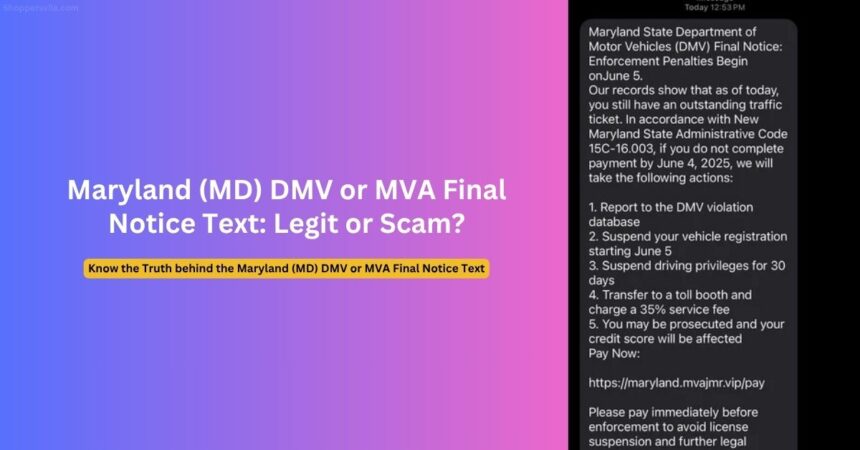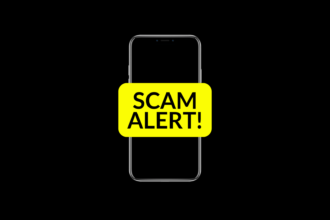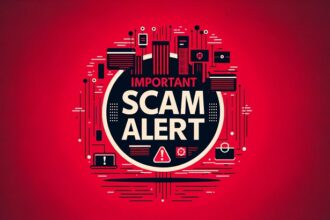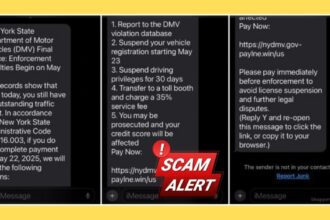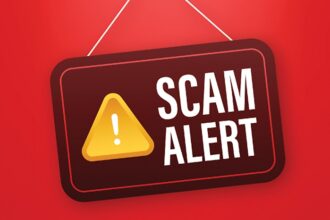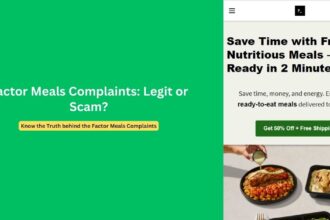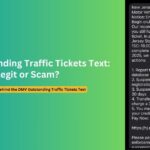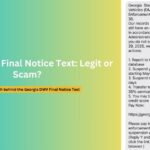A sophisticated Maryland DMV Final Notice Text Scam is rapidly spreading across the state, targeting unsuspecting residents with fake traffic ticket notifications. The Maryland Motor Vehicle Administration (MVA) has issued urgent warnings about fraudulent text messages claiming to be “final notices” for outstanding traffic violations.
These malicious texts are designed to steal personal information and money from Maryland residents by creating false urgency around supposed unpaid traffic tickets. Here’s everything you need to know to protect yourself from this growing threat.
Overview of the Maryland DMV or MD MVA Final Notice Text Scam
The MD MVA Scam represents a new wave of “smishing” (SMS phishing) attacks specifically targeting Maryland residents. Scammers are mass-sending text messages that appear to come from the Maryland State Department of Motor Vehicles, claiming recipients have unpaid traffic tickets that require immediate attention.
These fraudulent messages create artificial urgency by threatening license suspension, vehicle registration cancellation, and legal prosecution if payment isn’t made within 24-48 hours. The scam has been reported across all major Maryland counties and cities, affecting thousands of residents daily.
What makes this particular scam especially dangerous is its professional appearance and use of official-sounding language that can easily fool unsuspecting recipients into believing the threat is legitimate.
How the Maryland State Department of Motor Vehicles Outstanding Traffic Ticket Text Scam Works
The MVA Scam follows a sophisticated multi-step process designed to maximize victim compliance:
Step 1: Mass Text Distribution
Scammers use automated systems to send thousands of identical messages to Maryland phone numbers, often targeting area codes like 240, 301, 410, and 443.
Step 2: Fear Induction
The messages create immediate panic by threatening severe consequences including:
- License suspension within 24-30 days
- Vehicle registration cancellation
- Credit score damage
- Legal prosecution
- Additional fees and penalties
Step 3: Urgency Creation
By setting tight deadlines (often within 1-2 days), scammers pressure recipients to act quickly without taking time to verify the legitimacy of the claim.
Step 4: Information Harvesting
When victims click the malicious links, they’re directed to fake websites designed to steal:
- Personal identification information
- Credit card details
- Social Security numbers
- Banking information
- Driver’s license numbers
Step 5: Financial Exploitation
Once scammers obtain payment information, they can:
- Make unauthorized charges
- Sell personal data on the dark web
- Use information for identity theft
- Continue targeting the victim with additional scams
Fake Text Patterns and Examples
Common MD MVA Traffic Tickets Text Examples
Example 1: Standard Final Notice Format
Maryland State Department of Motor Vehicles (DMV) Final Notice:
Enforcement Penalties Begin onJune 5. Our records show that as of today, you still have an outstanding traffic ticket. In accordance with New Maryland State Administrative Code 15C-16.003, if you do not complete payment by June 4, 2025, we will take the following actions:
1. Report to the DMV violation database
2. Suspend your vehicle registration starting June 5
3. Suspend driving privileges for 30 days
4. Transfer to a toll booth and charge a 35% service fee
5. You may be prosecuted and your credit score will be affected
Pay Now: https://mva.maryland-govxr.icu/us
Please pay immediately before enforcement to avoid license suspension and further legal disputes. (Reply Y and re-open this message to click the link, or copy it to your browser.)
Example 2: Urgent Payment Demand
URGENT: Maryland MVA Final Notice
Your vehicle registration will be SUSPENDED in 48 hours due to unpaid violation #MD2025-7834.
Pay immediately: https://maryland-gov-payment.net/settle
Failure to pay will result in license suspension and court proceedings.
Example 3: EZ-Pass Related Scam
Maryland Transportation Authority Notice:
Outstanding EZ-Pass toll charges must be paid by June 5th or face:
– $150 penalty fee
– License suspension
– Vehicle registration hold
Pay now: https://mva-ezpass-maryland.com/payment
Critical Red Flags to Identify Fraudulent Maryland (MD) DMV or MVA Final Notice Texts
Phone Number Red Flags
- International country codes: Numbers starting with +63 (Philippines), +44 (UK), or other non-US codes
- Email addresses as senders: Messages from random Gmail, Outlook, or other personal email accounts
- Unusual area codes: Numbers that don’t match legitimate Maryland government patterns
Content Red Flags
- Wrong agency name: Using “DMV” instead of “MVA” (Maryland Motor Vehicle Administration)
- Fake legal codes: References to non-existent “Maryland State Administrative Code” sections
- Grammar errors: Poor spelling, missing spaces, incorrect capitalization
- Generic language: No specific personal details, violation numbers, or dates
- Nonsensical threats: References to “toll booths” or impossible enforcement actions
URL Red Flags
- Non-government domains: Anything not ending in “.gov”
- Suspicious extensions: URLs ending in “.icu”, “.net”, “.com” claiming to be government sites
- Extra characters: Domains with hyphens, extra letters, or random characters
- Shortened links: Bit.ly, tinyurl, or other URL shorteners
Communication Red Flags
- Text message delivery: Real MVA communications come via postal mail, not text
- Immediate payment demands: Government agencies provide multiple notices and grace periods
- Link activation instructions: Requests to “Reply Y and re-open” indicate scam tactics
- Urgent deadlines: Legitimate government notices provide reasonable timeframes
Statewide Scam Campaign Affecting All Maryland Cities
Baltimore Area Targets
Residents across Baltimore, Towson, Dundalk, Catonsville, and Essex have reported receiving these fraudulent MD MVA Scam messages, with particularly high concentrations in densely populated neighborhoods.
Annapolis and Central Maryland
Anne Arundel County residents in Annapolis, Glen Burnie, Severna Park, and Crofton are experiencing significant scam activity, likely due to high commuter traffic and EZ-Pass usage.
Montgomery County Affected Areas
Rockville, Silver Spring, Gaithersburg, Germantown, and Bethesda residents are prime targets, with scammers exploiting the area’s high-income demographics and frequent toll road usage.
Prince George’s County Incidents
College Park, Bowie, Largo, Hyattsville, and Upper Marlboro have seen widespread distribution of these Maryland State Department of Motor Vehicles Outstanding Traffic Ticket Text messages.
Southern Maryland Scam Reports
Charles County (Waldorf, La Plata), Calvert County (Prince Frederick), and St. Mary’s County (Lexington Park, Leonardtown) residents are receiving numerous fraudulent MVA text notifications.
Western Maryland Targets
Frederick, Hagerstown, Cumberland, and surrounding Washington County and Allegany County communities are experiencing increased scam activity.
Eastern Shore Vulnerability
Salisbury, Ocean City, Cambridge, and Easton residents across Wicomico, Worcester, Dorchester, and Talbot counties are being targeted with these sophisticated phishing attempts.
How to Protect Yourself from MVA or DMV Related Scam Messages
Immediate Response Protocol
- Do not click any links in suspicious text messages
- Do not reply to the message, even to say “STOP”
- Do not call any phone numbers provided in the text
- Screenshot the message for reporting purposes
- Block the sender immediately
Verification Steps
- Check official MVA website: Visit mva.maryland.gov directly (not through any links)
- Call MVA directly: Use official phone numbers from their website
- Review your driving record: Log into your legitimate MVA online account
- Check court records: Use Maryland’s official case search system
Account Security Measures
- Monitor credit reports for unauthorized activity
- Enable two-factor authentication on important accounts
- Use strong, unique passwords for government portals
- Set up account alerts for unusual activity
Family Protection
- Educate elderly family members about these scams
- Share red flag information with teen drivers
- Create verification protocols for urgent payment requests
- Establish communication channels for scam reporting within families
What to Do If You Receive a Fake Maryland DMV Final Notice Texts
Immediate Actions
- Take a screenshot of the entire message for evidence
- Block the sender to prevent future messages
- Report as spam to your phone carrier (forward to 7726/SPAM)
- Delete the message after documenting it
Reporting Procedures
- MVA Fraud Hotline: Contact the Maryland MVA to report the scam
- Federal Trade Commission: File a complaint at reportfraud.ftc.gov
- Internet Crime Complaint Center: Report to ic3.gov
- Maryland Attorney General: Submit reports through their consumer protection division
If You Already Clicked the Link
- Change all passwords immediately, especially for financial accounts
- Contact your bank to monitor for fraudulent transactions
- Run antivirus scans on your device
- Monitor credit reports for new account openings
- Consider a credit freeze if you provided sensitive information
If You Provided Payment Information
- Contact your bank immediately to report potential fraud
- Dispute any unauthorized charges with your credit card company
- Request new cards with different numbers
- File a police report for identity theft
- Consider professional identity monitoring services
Frequently Asked Questions (FAQs)
1. Is the Maryland DMV or MD MVA Final Notice Outstanding Traffic Ticket Text Legit?
No, these text messages are not legitimate. The Maryland Motor Vehicle Administration (MVA) does not send payment notices or violation warnings via text message. All official MVA communications regarding traffic violations, license issues, or payment requirements are sent through postal mail or through your official MVA online account. Any text claiming to be from the Maryland “DMV” is automatically suspicious since Maryland uses “MVA” as their official designation.
2. How Can I Tell if a Maryland MVA Text Message is Real or Fake?
Legitimate MVA communications will always come through official postal mail with Maryland state letterhead. Real notices will include specific personal information, exact violation details, case numbers, and legitimate contact information. Fake messages typically use generic language, wrong agency names (DMV instead of MVA), foreign phone numbers, suspicious URLs, and create artificial urgency with immediate payment demands.
3. What Should I Do if I Already Paid Money Through a Scam Link?
If you’ve already made a payment through a fraudulent link, contact your bank or credit card company immediately to report the unauthorized transaction and request a chargeback. Change all your online banking passwords, monitor your accounts for additional unauthorized activity, and consider placing a fraud alert on your credit reports. File reports with the FTC, your local police, and the Maryland Attorney General’s office.
4. Can These Scam Texts Install Malware on My Phone?
While simply receiving the text message won’t install malware, clicking on the malicious links can potentially download harmful software to your device. These links may redirect to websites that attempt to exploit browser vulnerabilities or trick you into downloading malicious apps. Always avoid clicking links in suspicious messages and keep your device’s operating system and security software updated.
5. How Do Scammers Get Maryland Phone Numbers for These Attacks?
Scammers obtain phone numbers through various methods including data breaches, purchasing contact lists from marketing companies, using automated number generation targeting Maryland area codes (240, 301, 410, 443), and harvesting numbers from social media profiles and public directories. They may also acquire numbers from previous successful scams or through phishing attacks on legitimate businesses.
Conclusion
The Maryland DMV Final Notice Text Scam represents a serious and growing threat to residents across the state. These sophisticated phishing attempts exploit our natural concern about traffic violations and government compliance to steal personal information and money. By understanding the red flags, verification methods, and proper response protocols outlined in this guide, you can protect yourself and your family from becoming victims.
Remember that legitimate government agencies like the Maryland MVA will never demand immediate payment through text messages or threaten instant license suspension. When in doubt, always verify independently through official government websites and phone numbers. Share this information with friends and family members, especially elderly relatives who may be particularly vulnerable to these scams.
The key to defeating these scams is education and awareness. By staying informed about the latest scammer tactics and maintaining healthy skepticism about urgent payment demands, Maryland residents can significantly reduce their risk of falling victim to these fraudulent schemes.
Stay informed about the latest scam alerts and consumer protection tips with ShoppersVila.com – your trusted source for staying one step ahead of fraudsters and protecting your financial security.
